
Swammerdamia pyrella is a moth of the family Yponomeutidae. It is found in Europe, North America and Japan.

Pseudoswammerdamia combinella is a moth of the family Yponomeutidae. It is found in Europe and Anatolia.

Argyresthia spinosella is a moth of the family Yponomeutidae. It is found in Europe and Anatolia.

Argyresthia conjugella, the apple fruit moth, is a moth of the family Yponomeutidae. It is found in Europe, Siberia, Central Asia, Japan, and North America.
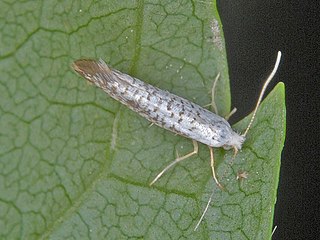
Argyresthia retinella is a species of moth of the family Yponomeutidae.

Prays fraxinella, also known as the ash bud moth, is a moth of the family Plutellidae found in Europe. The larvae are leaf miners, feeding on the leaves and buds of ash trees.

Paraswammerdamia lutarea is a moth of the family Yponomeutidae. It is found in Europe.

Zelleria hepariella is a moth of the family Yponomeutidae. It is found in Europe and northern Asia Minor.
Argyresthia arceuthina is a moth of the family Yponomeutidae. It is found in Europe.
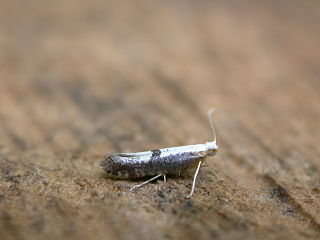
Argyresthia semifusca is a moth of the family Yponomeutidae. It is found in Europe.
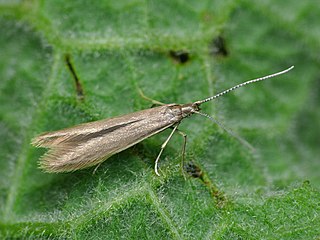
Coleophora caespititiella is a moth of the family Coleophoridae. This species is found throughout the United Kingdom and most of Europe. It is also known from North America. The Coleophoridae group are often collectively known as the case moths or case-bearers.
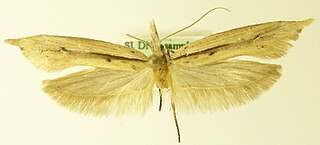
Ypsolopha mucronella is a moth of the family Ypsolophidae. It is found from Europe, through Siberia to Japan and in Asia Minor.

Plutella porrectella is a moth of the family Plutellidae found in Europe, the Caucasus, southern Siberia and Asia Minor.

The testaceous white-back is a moth of the family Coleophoridae. It is found in most of western Europe.
Ypsolopha barberella is a moth of the family Ypsolophidae. It is known from the United States, including Arizona, Nevada and Utah.
Ypsolopha striatella is a moth of the family Ypsolophidae. It is known from the United States, including California.
Ypsolopha walsinghamiella is a moth of the family Ypsolophidae. It is known from the United States, including Arizona and California.
Ypsolopha buscki is a moth of the family Ypsolophidae. It is known from the United States, including Arizona.

Coleophora adjunctella is a moth of the family Coleophoridae found in Europe.
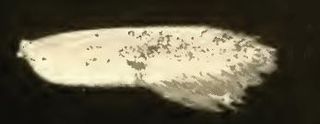
Argyresthia rileiella is a moth of the family Yponomeutidae. It is found in North America, including Washington, D.C.













